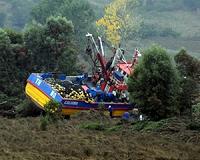| . |  |
. |
Santiago (AFP) March 19, 2010 Chile's government Friday lowered the official death toll from the massive February 27 earthquake to 452 in the latest development in the controversial casualty count from the disaster. Officials said that in addition to the dead, another 96 people were missing or unaccounted for. The death toll reported by officials had been as high as 802, but authorities have revised that downward. A week after the quake, officials had said 497 bodies had been identified, but the latest figures were showed fewer casualties. "Twenty days after the earthquake, it is still difficult to measure its impact," Interior Minister Rodrigo Hinzpeter said in announcing the new figures. Hinzpeter also said the number left homeless was now estimated to be 800,000, down from earlier reports of around two million. The number of homes destroyed, he said is believed to be 200,000, or less than the half-million figure earlier reported. The figures were the first from the new government of President Sebastian Pinera, who was sworn in March 11. The Chilean government has formed a panel to determine the number of people killed in the 8.8 magnitude earthquake in an effort to sort out contradictory toll figures released by different government offices over the past two weeks.
Chile mulls new tax to fund reconstruction Pinera took office less than two weeks after the 8.8-magnitude temblor struck, only to see many of his election pledges challenged by the disaster. Foremost among Pinera's pledges was a visionary plan to move Chile forward with cash that was available before the quake struck. In his campaign speeches Pinera promised to create 1 million jobs, reduce income disparities and facilitate poverty reduction. Now the government's priority is to rush aid to stricken areas and create 60,000 jobs where destruction has caused unemployment while depriving citizens of basic amenities, education and healthcare. More than 200,000 homes were destroyed by the earthquake and resulting tsunami and more than 2,750 schools and 35 hospitals have had to be abandoned until they are rebuilt. The government's plan is to raise the royalty tax on the country's mining sector, Chile's most important earner mainly through copper exports. The current 5 percent royalty tax went into effect in 2005 and earned the government more than $570 million in 2008. Before his election Pinera indicated he favored privatization of copper mining but had no public intention to raise the tax. The earthquake forced him to shift priorities, however. Earnings from a mining tax increase will be minuscule when compared with the amounts required for reconstruction. He told Chileans in a televised address the earthquake damage was equivalent to 17 percent of the country's gross domestic production. Pinera indicated his election targets for economic development would be slower to achieve but he remained optimistic that the goals would be met before the end of his term in 2014. Responding to skeptics, Pinera said he was committed to a "responsible" macroeconomic policy that would allow the Chilean economy to remain competitive and achieve fiscal balance. Market analysts expressed concern that Chile's economic targets may have been skewed by the devastating earthquake. Pinera reminded skeptics that he had to take into account not only the earthquake but also the effects of the 2008 economic downturn that his predecessor, Michele Bachelet, had to cope with. Chile was severely hit by the economic crisis, partly because of its economy and markets being connected with global markets more closely than its Latin American neighbors. The government's optimism about funding the gigantic repair and reconstruction program is based largely on current prices of the copper price, which is about $3 a pound compared with 70 cents a pound in 2005. It is expected to remain high in the coming years as copper demand is seen to increase in the coming years by about 8 million tons.
Share This Article With Planet Earth
Related Links Bringing Order To A World Of Disasters When the Earth Quakes A world of storm and tempest
 Chilean courts to probe tsunami warning failures
Chilean courts to probe tsunami warning failuresSantiago (AFP) March 16, 2010 The Chilean justice system is to probe why a tsunami detection and warning system failed to more quickly alert citizens in a wake of a massive 8.8-magnitude quake last month. The absence of a tsunami warning led to significant loss of life, injury and destruction in coastal villages, and prompted a political blame game that has already led to one official resigning and another being fired. ... read more |
|
| The content herein, unless otherwise known to be public domain, are Copyright 1995-2010 - SpaceDaily. AFP and UPI Wire Stories are copyright Agence France-Presse and United Press International. ESA Portal Reports are copyright European Space Agency. All NASA sourced material is public domain. Additional copyrights may apply in whole or part to other bona fide parties. Advertising does not imply endorsement,agreement or approval of any opinions, statements or information provided by SpaceDaily on any Web page published or hosted by SpaceDaily. Privacy Statement |